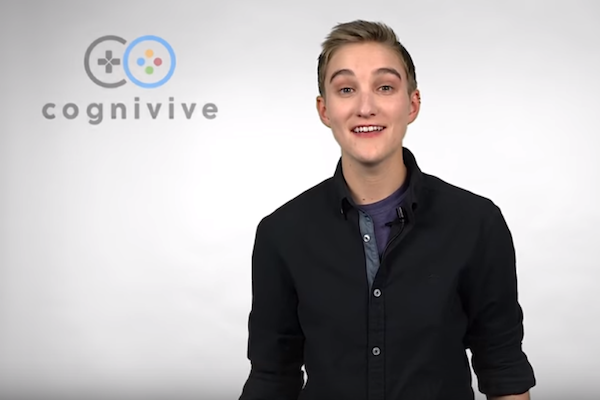An interview with Sara Howard, business development manager of Cognivive
Lesbians Who Tech cites that one in 15 people in STEM fields identify as women. Reaching Out MBA cites that just 3% of MBA students identify as LGBTQ. Women, especially LGBTQ women, are not generally who we think of when we think of Silicon Valley startups or corporate executives. Sara Howard is looking to change that.
Howard is a digital health professional with years of experience working in the larger healthcare sector. She has worked with medical providers, patient advocacy groups, and medical researchers and now works the exciting field of digital health. She is currently pursuing her MBA at the University of California, Davis, where she helped launch the program’s first LGBTQ student organization. She is part of the mighty three-person team that makes up Cognivive, Inc., a startup creating mixed-reality digital therapeutics to treat cognitive impairments.
Tell us a little about your background and how you ended up at a tech startup.
I actually started my career with the Mautner Project, which for those who aren’t familiar, was a nonprofit that worked with LGBTQ women facing life-threatening and/or life-altering illnesses. They have since merged with the D.C.-based provider, Whitman-Walker Health, where I also spent some time.
To be honest, though, I never saw myself working at a startup, especially not an early-stage startup like Cognivive. Cognivive just fit with my passion for healthcare and my interest in the introduction of new, disruptive technologies. I am by no means a gamer or a scientist, yet here I am working within the intersection of both to help commercialize our technology and improve outcomes for millions of patients.
What exactly does Cognivive do?
The company is only about a year old. We’re translating years of science by the Founder & CEO, Dr. Tony Simon, into what we call “digital neurotherapeutics.” Let me break that down: we are creating commercial quality virtual reality video games that are specially designed to target spatiotemporal processing in three patient populations—aging seniors, stroke and TBI patients, children with neurogenetic disorders—and elite athletes. Spatiotemporal processing is what we use to do many everyday activities, including balancing, reaching, math, telling time, and driving. What’s cool is the unique combination of the two co-founders: one is an expert video game designer—Ted Aronson, who is creating these therapies in-house—and the other, a neuroscientist. I come in on the business-side to round us out.
What do you love about working at a startup?
I have seriously never worked harder in my life. (Don’t tell any of my previous bosses.) Combine a fast-paced environment with a vertical learning curve and I’m certainly never bored. I get to tap every bit of my past professional and academic experience to solve problems. These problems don’t have a predetermined, clear path to an answer; I’m constantly adapting and reacting to new information, especially in an industry still in its infancy.
On a personal note, I love having a small role in creating a treatment that helps stroke patients. My dad suffered a typically fatal hemorrhagic brain stem stroke a few years ago and has been struggling with cognitive impairments ever since. He’ll actually be testing out some prototypes for us and helping to really co-create these digital treatments.
What is it like being a LGBTQ woman at the intersection of business and technology?
Hard and rewarding all at once. There is a serious need for more LGBTQ women in these spaces—I can’t emphasize that enough. I think the combination of my undergraduate experience at a women’s college (shout out to Mount Holyoke College) and my natural grit has helped. But it’s still lonely at times. Looking around a room and seeing no one who looks like you acts as a constant reminder of how much further we have to go. Never mind getting called “sir” when you’re wearing a name tag or have just handed someone your business card. I want to help create a better pipeline to increase access to these spaces for the next generation of LGBTQ leaders.
Tell us more about the competition you’re currently in with the NBA.
I’m really excited to share that Cognivive has made it to the final four (out of 75 initial startups) in the Sacramento Kings’ 2018 Capitalize competition. The competition is about encouraging technological innovation and entrepreneurship. We pitched to an executive panel of judges a couple of weeks ago in the Kings’ VIP lounge and are now working on winning over the fans. My 30-second pitch video is currently live on the Kings’ social media channels and will appear on the jumbotron at the Golden 1 Center during their Tech Night game on March 22.
Do you have any advice for entrepreneurial or tech-driven LGBTQ women?
You might find yourself alone on a path for a while, so get comfortable being uncomfortable, but don’t you dare give up. Resilience is key. We need you, because if you don’t innovate and change the world, who will?
Anything else you’d like to add?
I would be remiss to not encourage folks to vote for us before the game on March 22. They can vote by posting a tweet that includes @SacramentoKings @cognivive and #Capitalize2018. Retweets do not count. You can vote once daily. Vote, vote, vote!


